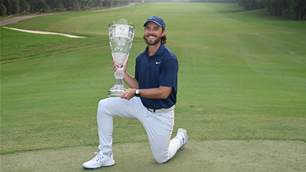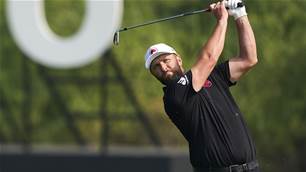The European Ryder Cup Captain turns 50 in August and has reserved aspirations to play the Champions Tour. Here, he reveals his dream of inspiring Tour pros of his generation by winning a fourth major and what it will take to win the Ryder Cup on US soil later this year.
Where did you find time in the midst of all this to get married?
I was 18 when Caroline and I started seeing each other. I was already in college at the time. My wife is the most organised person. Even in my early days on Tour, players would come to her to ask what they needed to do to get into tournaments, or go on vacation, or how the world rankings work. She would know how it all worked.
Caroline is very sporty. She’s into it. And she loves to tell the story of how she beat me at badminton.
I think we need to hear that.
She was a good player, maybe county standard when she was younger. So we decided to have a game. ‘What could go wrong?’ I thought. There’s a racquet and something to hit. I can do that. I got seven points in seven games. She kept smashing the shuttle past me and laughing.
 We played in a local municipal hall. There was a band practising nearby, so she was dancing as we were playing. I got a bit frustrated and we didn’t talk afterwards. I was not happy at her gloating. So yes, it’s safe to say she is competitive and she has taken that into my golf.
We played in a local municipal hall. There was a band practising nearby, so she was dancing as we were playing. I got a bit frustrated and we didn’t talk afterwards. I was not happy at her gloating. So yes, it’s safe to say she is competitive and she has taken that into my golf.
RIGHT: A young Paddy playing alongside his good mate, Jody Flanagan, in the Walker Cup. PHOTO: Getty Images.
Let’s talk about the Walker Cup. How do you look back on your amateur days?
At the time, you don’t really know what is happening when it comes to team selection. I was one of the lucky ones. I always got picked when I should have been, with one exception. I didn’t get picked for the 1994 Great Britain & Ireland Eisenhower Trophy team. Four good players were picked, but I felt like I should have been in there.
I looked it up. You beat Stephen Gallacher – who was picked – 4 & 3 the day before the team was announced.
4 & 3? Are you sure? There’s no way that was 4 & 3! It was 7 & 5, maybe 6 & 5. I’m going to check that out.
I had no problems with the four good players they picked, but I felt like I was out of sight in Ireland. I wasn’t alone in that, which is why things changed not long afterwards. Now the four home countries all have their own teams.
When you look at selection for amateur teams, I always think of the Maguire twins (Leona and Lisa) before a Curtis Cup. Ten players get picked. The first four are always automatic. That’s easy. Then there are four more – 5-6-7-8. Then another four – 9-10-11-12. That last four should be vying for the last two spots. Four for two. But because the selectors are all trying to get their own 9-10-11-12 players into the 5-6-7-8 group, they start arguing for those places early.
All of a sudden, 9-10-11-12 players are in at 5-6-7-8, which leaves four players that should have been in the 5-6-7-8 category vying for the two spots that are left, so you never get the best team. And every member of the committee walks out not really knowing why it happened. But they all say that there just wasn’t enough space for the obvious candidates that have missed out. That’s what happened with me and the Eisenhower. There just wasn’t enough space.
Warren Bennett was probably the best amateur at that time. Hardly any pros would hit the ball as well as he did. Lee James had won the Amateur Championship. Stephen had won the European Amateur. And Gordon Sherry was the fourth. All good players. But it was tough to miss out. That was the only team I never played on.
What is your fondest memory of your Walker Cups? Beating Tiger in foursomes at Royal Porthcawl in 1995?
I did enjoy that. I was playing with my pal, Jody Fanagan. We had been stalwarts playing for Ireland, so to win that match was a big deal for us.
When I look back, I was paired with Paul McGinley in 1991. But at that time I didn’t know Paul from Adam. Not really. He had been in America and he is five years older than me. They paired us together because we’re Irish. But that made no sense. Our games had nothing in common. Paul was always down the middle, mister steady. I was all over the place. I needed someone who could handle my game and he needed someone who was used to his.
That was the thinking back then, that a straight-hitter should play with a wild guy, which is such nonsense.
By the way, you and Paul have to be unique in that you have been partners in the Walker Cup, the Ryder Cup and the World Cup, which you won for Ireland.
That has to be right and we went to the same school. We lived about two miles apart in Dublin and his wife, Alison, is blonde like mine (laughs). She is unbelievably talented by the way. She can go a whole year without playing, then go out and play great. She’s so good she can’t understand why everyone else finds it difficult. She is phenomenal.
Turning to the Ryder Cup, you have had many different partners. You seem like the guy anyone could play with.
I bounced around a lot. I was the guy who said he would play with anybody and they took me at my word (laughs).
In hindsight, I maybe should have been more selfish. I look at my record now and it disappoints me. I started off flying in the singles and won my first three. Then I lost the next three. I lost my way in match play. Until 2006-07, I was a great match player, but after that I was terrible and I know why.
Up to 2006, I went into every game afraid I was going to get a hiding, which is how I was as an amateur too. In my mind, I hyped up my opponents thinking they were going to beat me. But later on – while I didn’t get cocky or conceited – I lost that mentality. Before, if my opponent missed a green I’d think he would chip-in. Later, I got cynical, thinking he couldn’t possibly get up-and-down from there. Then he would do just that, as I was three-putting.
I remember playing against Scott Verplank at The K Club in 2006. I went out there thinking he couldn’t beat me on that course. It was just too long, which was silly. Scott is a really good player. He had a point to prove that week and he played great.
Anyway, my point is that I played my best golf when I was scared. But I stopped being scared. I lost my edge. I got defensive. I lost my way. And I lost the ability to generate the fear I need to play great.
Related Articles

Fleetwood keeps golden year going with India triumph

Huggan: Confident tours wouldn't be bothered by LIV Golf













